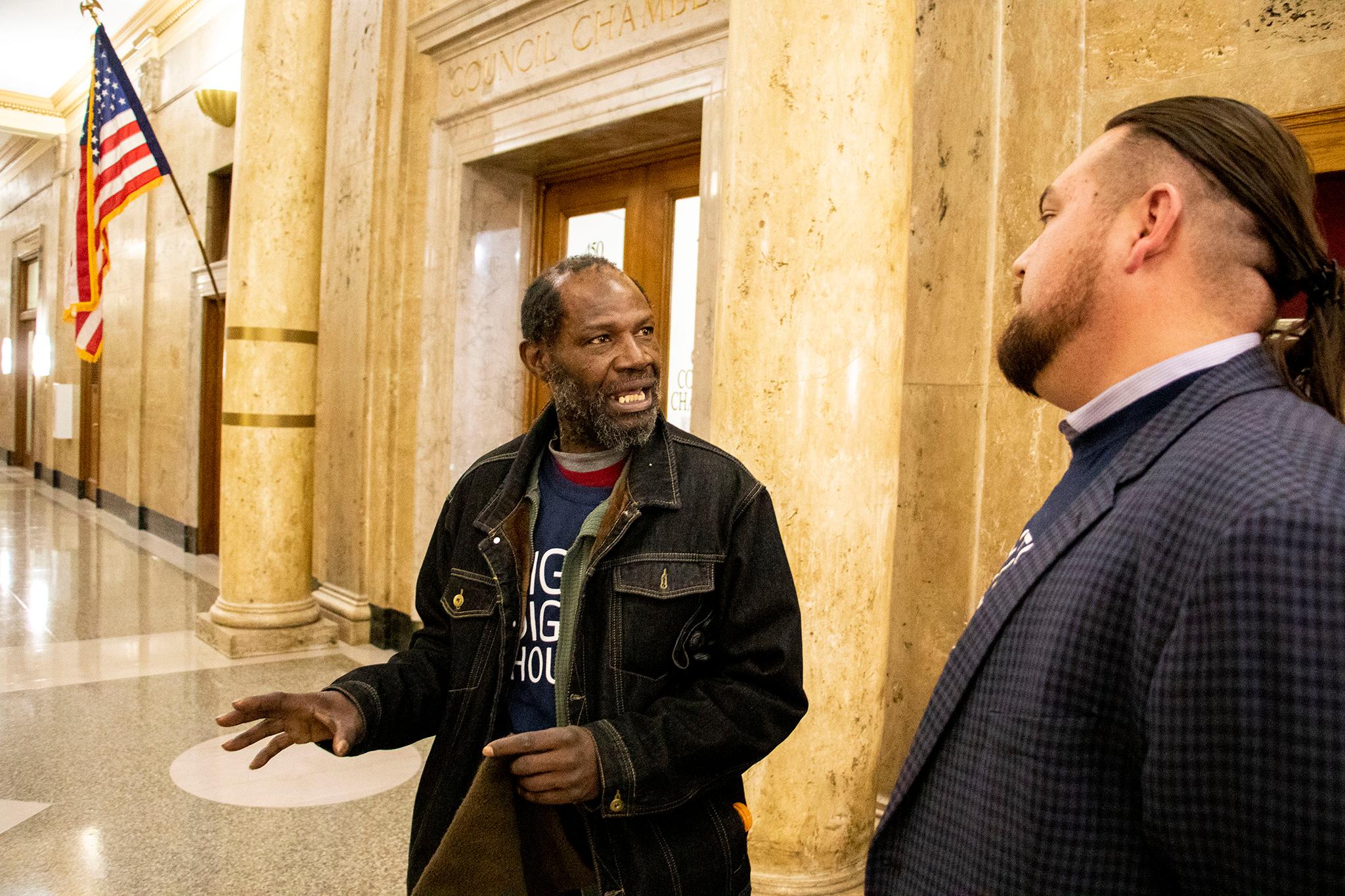The activist whose challenge led to a judge declaring Denver's urban camping ban unconstitutional has an idea for how the city could spend what it costs to appeal the legal ruling and police people who are experiencing homelessness.
"The money should be used to ... subsidize people living on the streets to be moving into some of these luxury apartments," Jerry Burton said in an interview Tuesday. "I just think what the city is doing is a waste of money."
Burton, who predicted the city would lose its appeal, spoke a day after the city attorney's office said police would resume enforcing the urban camping ban. Since officers suspended enforcement on Dec. 27, people experiencing homelessness have erected tents at Civic Center Park and elsewhere in Denver.
Ryan Luby, spokesman for the City Attorney's Office, said Monday that suspending enforcement was a step taken out of "an abundance of caution." He said the city read the judge's ruling narrowly and had decided to resume enforcement of the ban. Luby said enforcement would resume sometime this week.
Attorney Andy McNulty, who represented Burton in his challenge of the camping ban, said Denver officials' decision to resume enforcement "shows a lot about how much they care about the constitution."
McNulty said he could take legal action on behalf of someone affected by the renewed enforcement and was considering doing so.
Burton no longer lives on the streets as he was April 29 when his case began with a police officer issuing him a ticket under the ban enacted by City Council in 2012. The ban outlaws on public property such activities as eating, sleeping or storing belongings while sheltering with tents, tarps or blankets.
Police say the low number of tickets and arrests proves they are not criminalizing homelessness.
According to police statistics covering the period from the ban's enactment in 2012 through 2019, police have contacted nearly 24,000 people who appeared to violate the ban but issued only 33 tickets. Police made three arrests.
City officials say the ban is necessary to protect health and safety and also provides a way to connect people experiencing homelessness to services. The law requires police officers to prioritize getting people to comply by asking, and to get help for those who need it. Denver police don't often issue tickets or make arrests under the camping ban.
People experiencing homelessness testified during Burton's trial that encounters with police are stressful and led them to avoid covering themselves even in cold weather. The ban caused them to seek out places where they would not be approached, but which could also be unsafe.
Burton, an activist with the advocacy group Denver Homeless Out Loud, insisted on being given the ticket that led to his trial.
"We were trying to fight the constitutionality of this," Burton testified during four days of court hearings held over two and a half weeks late last year.
Denver County Judge Johnny Barajas held the hearings to explore a request from Burton that his camping ban charge be dismissed because the law was unconstitutional. In his Dec. 27 ruling, Barajas cited evidence presented during the hearings that Denver's shelters are inadequate and that the ban violates constitutional protections against cruel and unusual punishment for that reason.
The city had argued before Barajas that its shelters met emergency needs. Not addressed in the hearings during Burton's trial were city plans to improve shelters to serve more people and help transition them to permanent housing.
Barajas dismissed the criminal case against Burton. He included nothing in his ruling on what broader action the city should take regarding the camping ban.
Burton's Denver Homeless Out Loud had tried and failed last year to persuade Denver voters to overturn the ban. The group also tried and failed repeatedly to get the state legislature to overturn the camping ban.
Luby, the City Attorney's Office spokesman, said this week that resuming enforcement of the ban depended on "a number of different factors that we're still trying to sort out." He would not elaborate.
Early Tuesday, Earnest Hunter said he and other people sleeping in tents that have been proliferating at Civic Center since the judge's ruling were awakened by two police officers.
"They said, 'Everybody get up, get up. You all got to get up, You've got to move,'" Hunter said.
He said the officers did not stay long. Interviewed later Tuesday, Hunter said he would be moving and would try to find a camping spot that would draw less attention.
Hunter, who said he'd just gotten word he would get work as a roofer, said he avoids shelters.
"I've got a thing against bed bugs. I'd rather sleep outside," he said.
Denver health officials announced late Tuesday they planned an emergency cleanup near Civic Center on Wednesday. The operation began Wednesday with police closing Lincoln Memorial Park between Civic Center Park and the state Capitol and telling people to remove their tents and other belongings from the park. Ann Cecchine-Williams, deputy executive director of the Denver Department of Public Health and Environment, said the closure is for public health and safety. Danica Lee, director of public health investigations for the city, said a pregnant woman reported that a rat had chewed into her tent while she was sleeping.
"It's just not a good environment," Lee said.
Such clean-ups are not related to the camping ban.
Activist Burton said that people were choosing the streets over shelters, not over housing in a city where housing costs have risen faster than wages.
"It's not about sleeping outside. It's about they can't afford a place in the city of Denver," Burton said. "You're working every day, but you can't afford an apartment in the city where you work."
"I'm not advocating for people to sleep outside," Burton said. "I'm saying, if the system has failed them, they have a right to do what they need to do to survive."













